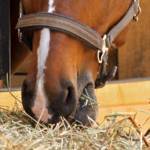Starch Improves Digestibility of Low-Quality Forage in Horse Diets

According to a recent study, starch-rich diets may help improve digestibility of fiber when horses are fed low-quality forages. On the flip side, horses fed high-quality hay did not benefit from the addition of a concentrate with regard to fiber digestibility.*
“These findings suggest that feeding concentrates, which are often high in starch, may have more benefit than simply providing horses with additional calories from a lower-quality forage,” explained Kathleen Crandell, Ph.D., a nutritionist for Kentucky Equine Research.
This finding was discovered during an in vitro digestibility study conducted by researchers at Missouri State University.
“In vitro digestibility systems are an alternative to digestibility studies used in live horses (in vivo). To determine digestibility in vivo, nutrients in the horses’ feed are measured against nutrients found in the horse’s feces,” she said. “The difference determines how much of a given nutrient is digested and absorbed by the horse.”
When using in vitro systems, anaerobic microbes are isolated from fecal samples collected from donor horses. They are placed in fermentation jars along with the feed to be digested to mimic the cecal environment. The feed and microbial mixture are incubated at a constant body temperature (39°C) for a set amount of time (48 hours), the same length of time feed would remain in the hindgut. The nutrients in the feed before and after fermentation are measured to calculate digestibility.
“Regardless of the system used, high digestibility means that horses are able to extract the nutrients efficiently from their feed and less feed is ‘wasted’ compared to low digestibility in which horses get less out of the feed,” explained Crandell.
Researchers use in vitro digestibility systems when conducting research on dry matter, organic matter, and fiber digestibility. According to Crandell, it is easier to quantify fiber fermentation in a laboratory setting rather than in the field.
In a recent in vitro digestibility study, researchers hypothesized that the diets of donor horses would affect the microbial populations in the feces that were then used to digest forages in digestibility studies, thus affecting results.* If this hypothesis proved true, then the digestibility study results would vary depending on the diet and fecal microbiome of the donor. This may prompt the use of pooled fecal samples from various donors to help decrease the effect of the donor’s individual fecal microbiome and make digestibility study results more generalizable.
“As expected, the donor diets altered the digestibility of feeds. But it was somewhat surprising that the high-starch diets improved the digestibility of low-quality forages that had crude protein levels less than 8% and more than 72% neutral detergent fiber,” Crandell said. “These results suggest that horses can get more out of a low-quality hay if they are offered a concentrate with it. This is encouraging because there are times when it is difficult to get high-quality hay and owners need to feed what they can get their hands on.”
Crandell also pointed out that it was likely the starch in the concentrate that affected the microbial population that fermented the low-quality hay for it to be more digestible.
It’s important to understand, according to Crandell, that there is a difference between low-quality hay (clean but higher fiber and lower protein) and poor-quality hay (bleached, heat damaged, moldy, or dusty). This research does not suggest that adding grain will make up for nutrients not found in poor-quality hay.
“For horses that can get enough calories from hay, a low-intake ration balancer or a well-formulated vitamin and mineral supplement should also be fed. This ensures that any nutritional shortfalls of the forage are met,” Crandell recommended.
*Godwin, T., G. Webb, and P. Lancaster. 2021. Effect of donor diet on in vitro digestibility of forages by fecal inoculate. Journal of Equine Veterinary Science 105:103722.








